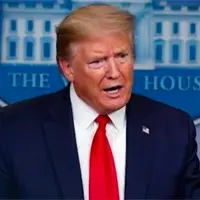The Trump presidency was more like an antihero cable drama than a reality show
-

"For years, struggling with how to think about this crazy presidency, people have compared the Donald Trump administration to reality TV," says Joanna Weiss. "The tropes showed up daily: the shameless overstatement, the manufactured conflict, the need for a winner and loser at the end of every news cycle. Trump was already a reality TV star, which meant he knew the tricks. And of course, this all was actually real life. It’s true that the Trump show has been a lot like television. But as an overall arc, these past five years were less like a reality show than a different genre entirely: a prestige cable drama, the kind built around a powerful antihero. The antihero show—of which HBO’s The Sopranos remains the shining example—has become its own kind of cliché over the past two decades. It revolves around a central figure, a singular agent of chaos: usually male, surprisingly charismatic, emotionally inaccessible, simmering with rage that sometimes bubbles to the surface, and all-too-willing to cross ethical boundaries. Think Walter White in AMC’s Breaking Bad, Don Draper in AMC’s Mad Men. (The list keeps growing: Kendall Roy in HBO’s Succession, Bobby Axelrod in Showtime’s Billions, Marty Byrde in Netflix’s Ozark.) The antihero embodies some blunt truths about humanity. He creates his own convenient code of ethics. He finds fissures in the system and sucks supporting characters into his maelstrom. He holds up a mirror to our frailties, while making us feel superior for being less venal than that. This was the real-life Trump who occupied the Oval Office. The lifelong political players who entered his orbit, with barely an exception, were marked and remade into Trumpians in the end. The Washington he blustered into wasn’t some utopia he sullied, but a flawed enterprise that he exposed for its many weaknesses. And watching him was, for many, an obsession. Over the past five years, Trump’s fiercest hate-watchers and biggest fans followed his moves and tweets the way addicted viewers do: incapable of looking away, driven to rehash and recount every sordid moment. The Trump drama played out over a few distinct seasons. Season One was a come-from-behind campaign story that ended with unlikely victory. Season Two showcased an accidental administration, with supporting roles for Sean Spicer, Steve Bannon and Anthony Scaramucci. Season Three centered on the Mueller Investigation. (Mid-series plots always tread water for a bit as the writers bide time ‘til the finale.) Season Four upped the dramatic ante with an election and a global pandemic. The comparisons are so eerily accurate that it’s tempting to look to TV for predictions about how this all ends." But how does it all end? Weiss thinks that Trump's post-presidency will end up playing out more like The Shield's acclaimed series finale. "He thought he’d beaten the system, but in fact, the system prevailed, chopping the flawed hero down into a bureaucratic also-ran," she says of Vic Mackey. The same can be said about Trump and the United States.
TOPICS: Trump Presidency, The Shield, Donald Trump
More Trump Presidency on Primetimer:- Mark Meadows Aide Cassidy Hutchinson Is January 6th Committee's Surprise Witness: Report
- Before Fox Business anchor Maria Bartiromo interviewed then-President Trump in November 2020, she texted her questions to his chief of staff Mark Meadows
- Is the presidential debate dead?: Republican National Committe votes to withdraw from the Commission on Presidential Debates
- The View Podcast: Fool Us Twice, Stephanie Grisham
